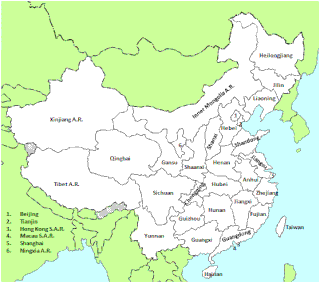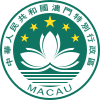
The economy of Hong Kong is a highly developed free-market economy. It is characterised by low taxation, almost free port trade and a well-established international financial market. Its currency, called the Hong Kong dollar, is legally issued by three major international commercial banks, and is pegged to the US dollar. Interest rates are determined by the individual banks in Hong Kong to ensure that they are market driven. There is no officially recognised central banking system, although the Hong Kong Monetary Authority functions as a financial regulatory authority.

The World Trade Organization (WTO) is an intergovernmental organization that regulates and facilitates international trade. Governments use the organization to establish, revise, and enforce the rules that govern international trade. It officially commenced operations on 1 January 1995, pursuant to the 1994 Marrakesh Agreement, thus replacing the General Agreement on Tariffs and Trade (GATT) that had been established in 1948. The WTO is the world's largest international economic organization, with 164 member states representing over 98% of global trade and global GDP.
The Mainland and Hong Kong Closer Economic Partnership Arrangement, or Closer Economic Partnership Arrangement (CEPA) for short, is an economic agreement between the Government of the Hong Kong Special Administrative Region and the Central People's Government of the People's Republic of China, signed on 29 June 2003. A similar agreement, known as the Mainland and Macau Closer Economic Partnership Arrangement, was signed between the Government of the Macau Special Administrative Region and the Central People's Government on 18 October 2003.

The Ministry of Commerce of the People's Republic of China (MOFCOM) is a cabinet-level executive agency of the State Council of China. It is responsible for formulating policy on foreign trade, export and import regulations, foreign direct investments, consumer protection, market competition and negotiating bilateral and multilateral trade agreements. It is in charge of the administration of foreign trade pursuant to the Foreign Trade Law. The current Commerce minister is Wang Wentao.

Special economic zones (SEZs) in mainland China are granted more free market-oriented economic policies and flexible governmental measures by the government of China, compared to the planned economy elsewhere. This allows SEZs to utilize economic management which is more attractive to foreign and domestic businesses. In SEZs, "...foreign and domestic trade and investment are conducted without the authorization of the Chinese central government in Beijing" with "tax and business incentives to attract foreign investment and technology".
A free trade agreement (FTA) or treaty is an agreement according to international law to form a free-trade area between the cooperating states. There are two types of trade agreements - bilateral and multilateral. Bilateral trade agreements occur when two countries agree to loosen trade restrictions between the two of them, generally to expand business opportunities. Multilateral trade agreements are agreements among three or more countries, and are the most difficult to negotiate and agree.

A Trade and Investment Framework Agreement (TIFA) is a trade pact that establishes a framework for expanding trade and resolving outstanding disputes between countries.

In international trade, market access is a company's ability to enter a foreign market by selling its goods and services in another country. Market access is not the same as free trade, because market access is normally subject to conditions or requirements, whereas under ideal free trade conditions goods and services can circulate across borders without any barriers to trade. Expanding market access is therefore often a more achievable goal of trade negotiations than achieving free trade.
Closer Economic Partnership Arrangement are economic and trade agreement between the separate customs territories within the People's Republic of China.

Under the Basic Law, Macau's diplomatic relations and defence are the responsibility of the central government of China. Except diplomatic relations and defence, nonetheless, Macau has retained considerable autonomy in all aspects, including economic and commercial relations, customs control.

The Hong Kong General Chamber of Commerce was founded on 29 May 1861, and is the oldest and one of the largest business organizations in Hong Kong. It has around 4,000 corporate members, who combined employ around one-third of Hong Kong's workforce. It is a self-funding, not-for-profit organization that promotes and represents the interests of the Hong Kong business community. A core function of its work is to formulate recommendations on improving the business environment, which its 23 industry-specific committees constantly analyze and make regular submissions to HKSAR Government officials and policy makers.

The Economic Cooperation Framework Agreement (ECFA) is a free trade agreement (FTA) between the governments of the People's Republic of China and the Republic of China, that aims to reduce tariffs and commercial barriers between the two sides, as well as improve cross-strait relations.
The Comprehensive Economic Partnership for East Asia (CEPEA) is a Japanese led proposal for trade co-operation, free trade agreement, among the 16 present member countries of the East Asia Summit. All those movements and efforts were taken over by the following Regional Comprehensive Economic Partnership.
The Hong Kong – New Zealand Closer Economic Partnership Agreement is a bilateral free trade agreement signed between the Hong Kong Special Administrative Region of China and New Zealand in March 2010. It is the first bilateral free trade agreement on goods and services that Hong Kong SAR has signed with a foreign country. Hong Kong-New Zealand CEPA complements New Zealand's Free Trade Agreement (FTA) with China two years before, and enhances the potential for Hong Kong to be used as a platform for trade into the Mainland China. Hong Kong is a Special Administrative Region of China but has autonomy in matters of trade.

Qianhai Shenzhen-Hong Kong Modern Service Industry Cooperation Zone is a commercial development in Shenzhen, Guangdong that is also known as Qianhai New District. Located in Nanshan District and encircled by the Shuangjie River, Yueliangwan Boulevard, Mawan Boulevard and Qianhai Bay, Qianhai covers an area of approximately 15 square kilometres (5.8 sq mi), comprising almost entirely reclaimed land. The project is expected to be completed by 2020.

The Central Leading Group on Hong Kong and Macau Affairs is an internal policy coordination group of the Central Committee of the Chinese Communist Party (CCP) and the State Council of the People's Republic of China, reporting to the CCP Politburo, in charge of supervising and coordinating Beijing's policy towards the Special Administrative Regions of Hong Kong and Macau. The Group is the highest de facto body for China's policy towards Hong Kong and Macau.

Hong Kong–mainland China relations refer to the relationship between Mainland China and Hong Kong. According to the 1997 Sino-British Joint Declaration, the United Kingdom handed control of Hong Kong over to the People's Republic of China, making it a special administrative region. In principle, Hong Kong became an autonomous administrative division based on the Hong Kong Basic Law.
India is party to free trade agreements (FTAs) and other trade agreements with many countries and trade blocs, and is negotiating with many others. According to the Ministry of Commerce and Industry, "India is a late, and cautious, starter in concluding comprehensive preferential tariff agreements covering substantially all trade with some of its trading partners."












